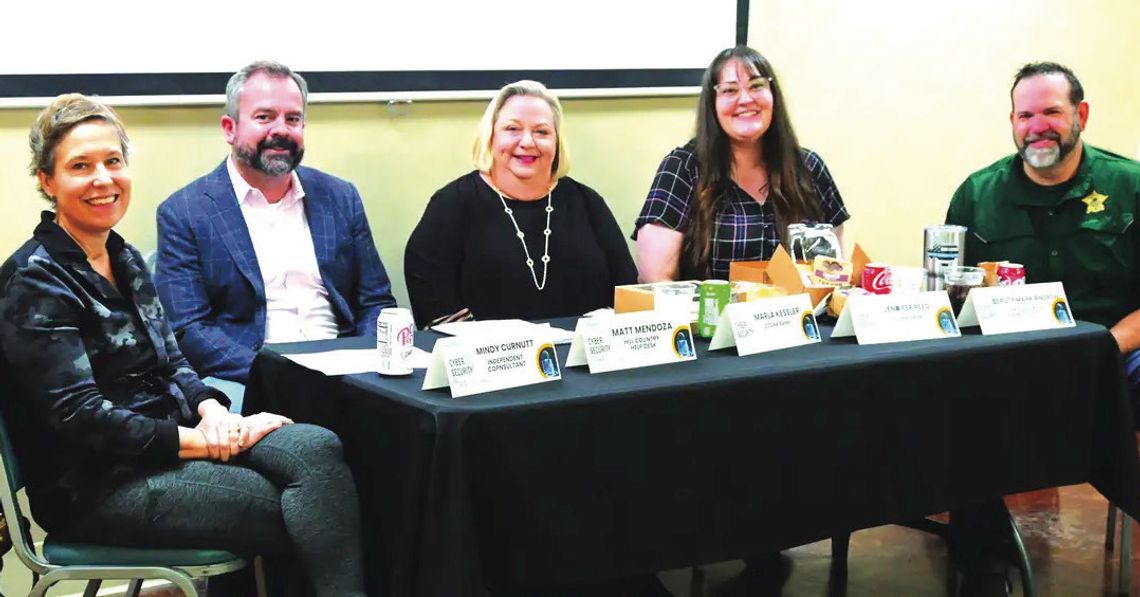A panel of Hays County experts on telephone scams, phishing emails, financial fraud and computer threats shared their experience with Wimberley Chamber of Commerce members and members of the public during a business education lunch ‘n learn event.
Mark Andrews, a deputy with the Hays County Sheriff ’s Office for 23 years, talked about three recent telephone scams in which citizens received phone calls to send money. Utilizing the number from the Sheriff ’s Office and naming legitimate members of the office, scammers called unsuspecting citizens to pay out money for fake warrants and bail money. He told listeners that the Sheriff ’s office will never call you.
Called the “grandma scam,” criminals called citizens to send bail money to release family members from jail. The thieves were convincing enough to name family members and used artificial intelligence software to clone voices that sounded like grandchildren. They often tapped them multiple times for large sums of money.
Deputy Andrews also warned of fraudulent emails and text messages that appear to come from the Sheriff ’s office. His advice on all of the scams was to hang up and call family and the Sheriff ’s Office to check the information.
Branch Operations Manager Jennifer Reed, who oversees a branch of Ozona Bank in San Marcos, told of financial scams in which thieves posing as bank employees urged people to transfer or send money from their account to another one. Their instructions were to go to a different branch to carry out the fraudulent transaction and not to talk with anyone at the home bank. Another scam urged account holders to convert their accounts to cryptocurrency to buy gold.
Reed also said to “Watch out for online loan scams that tell borrowers to send $1000.00 in cash quickly and they will give you a loan.” One scam, she said, targeted elderly persons who met strangers via Facebook messenger texts or in chat rooms. The scammer developed the relationship until she became the target’s “girlfriend,” who then asked for travel money, or to pay for citizenship fees or other expenses.
Common tools used by scammers include asking to act immediately, to pay in strange ways, and to request a social security number. While banks can cover fraudulent credit card charges, they can’t reimburse you for money that you took the action to send.
Reed was joined by Ozona Bank’s Marla Kessler in Wimberley to explain how to combat this type of fraud. They reminded participants that a bank will never call you. Upon receiving a call, they said to hang up and call the bank immediately to verify the request. For phony emails and websites purporting to alert you to financial centers, they said to check the websites and email senders for spellings that closely resemble the correct name but are fake.
They advised listeners to use strong passwords, two-factor authentication, be wary of out-of- the-blue or unusual requests and to travel with a major credit card, such as Visa, and not with a debit card. They also advised not to use Zelle to pay bills. The free service is currently facing large losses from fraudulent activity Matt Mendoza, owner of the Hill Country Help Desk, advised small businesses to avoid using gmail accounts to conduct business. He said that strong passwords were essential on all accounts and to not duplicate the same password for multiple accounts. He told attendees that, “Fortythree percent of small businesses don’t have an IT plan, and 42% were attacked in the last year.”
Fifty percent of phishing scams, Mendoza said, come in the form of Microsoft documents. He advised not to click on screen popups from McAfee, Microsoft, Google or Amazon because they could be fraudulent. He also warned against clicking on links or opening attachments from unknown senders. “1.2% of all emails are malicious,” he said.
Mindy Curnutt, who operates an IT consulting firm for trucking companies, told listeners that interstate commerce conducted by trucking companies is targeted by organizations “who want to do harm to our country.” Hacking, she said, has been nationalized by countries such as Russia and China, who sponsor hackers.
Some of the things she advised is to leave off addresses and phone numbers on checks if you mail them to pay bills and to contact the three major credit bureaus to freeze your credit for three months at a time if you feel you may be vulnerable.
.png)









